Imagine a city brimming with construction projects, all aimed at improving the quality of life for its residents. Infrastructure is the cornerstone of societal development, providing clean water, efficient transport, and safe public spaces. However, beneath the surface of progress, serious challenges loom.
Projects meant to uplift communities are plagued by cost overruns, corruption, and inefficiencies. Bidding processes are corrupted, public funds are misused, and timelines are continually delayed. As a result, public trust in government initiatives erodes, and the dream of a better future fades.This is a story repeated worldwide, highlighting the urgent need for solutions that bring transparency, efficiency, and accountability to infrastructure management.
The Problem: Complex Challenges in Infrastructure Management
Public infrastructure projects, especially those related to water and sanitation, are frequently plagued by several issues. Unrealistic budget estimates, price manipulation, and collusion in bidding processes lead to inflated costs and project delays. Lack of transparency in project pricing, fund allocation, and contract management hampers effective oversight, resulting in resource wastage and incomplete projects. Moreover, financial mismanagement and underutilization of funds are common, further complicating the delivery of essential services. Even after construction, inadequate maintenance due to poor audit monitoring and a lack of proactive management causes premature deterioration of infrastructure assets. Additionally, the absence of effective feedback systems leaves public grievances unaddressed, leading to service inefficiencies.
Our Solution: CiviLytix—Integrity Through Intelligence

To tackle these challenges head-on, we introduce CiviLytix—a comprehensive platform that integrates cutting-edge technologies like Artificial Intelligence (AI) and, crucially, Machine Learning (ML) into infrastructure management. CiviLytix is designed to ensure integrity, transparency, and efficiency in public projects through six core functionalities:
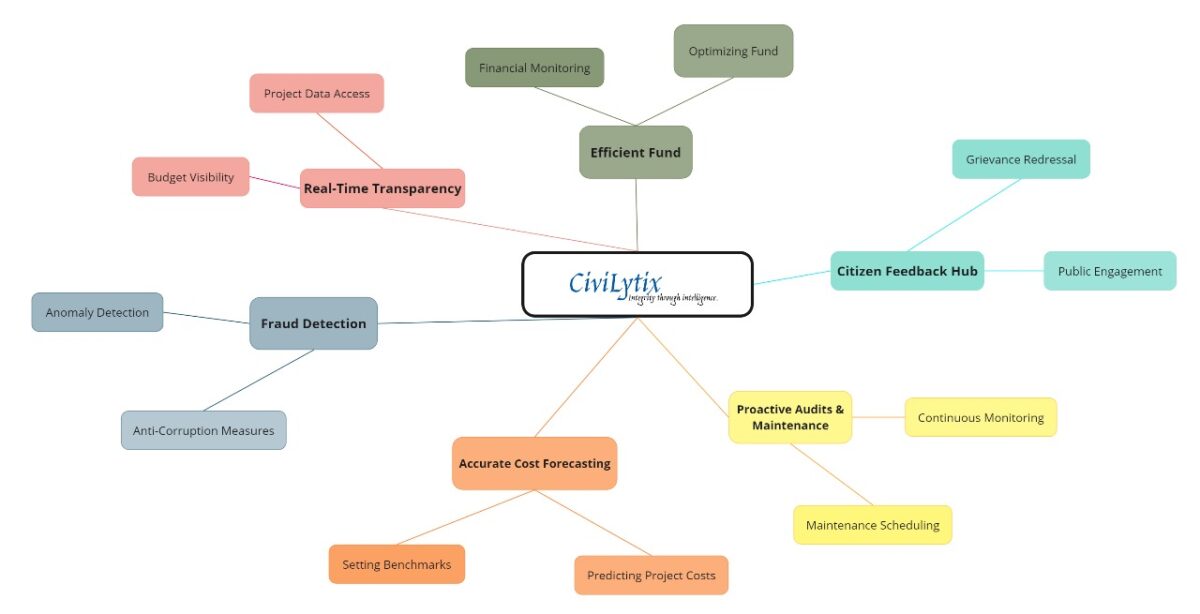
Price Prediction and Benchmarking Analysis: Leveraging AI, CiviLytix predicts accurate project costs by analyzing historical data and market trends. This helps in setting realistic budgets and prevents price-fixing and cost overruns, ensuring that financial mismanagement is minimized.

Type of Project and Scale of Project are two important features for the Machine Learning Model to predict the cost of a project.

The feature Soil Type is soil types contributes in prediction of the cost, as the Soft Soil is easier for the projects and Hard Soil are more costlier.

Using Neural Network in predicting cost to achieve Maximum Accuracy, while the error tries to reach near 0 with training.
Apart from the factor it is open to add up more features while scaling up the product.
The below are showing different Multi-criteria decision Making Methods, and their overall Meta-ranking for the Bids.


Instead of giving the top bids we can see the trend in the best bids to get a line for the top, where we find the deviation in ranking
Anomaly Detection: ML algorithms detect suspicious patterns in procurement and bidding processes, safeguarding against fraud and ensuring fairness and compliance throughout the project lifecycle.

Transparency in Project Pricing: Transparency is the cornerstone of public trust. CiviLytix provides real-time visibility into pricing, bidding, fund allocation, and project progress. This ensures accountability and deters corrupt practices.
Utilization of Funds: Effective financial management is key to successful project delivery. CiviLytix tracks fund utilization in real-time, ensuring optimal allocation and preventing underutilization or mismanagement.
Audit Monitoring and Infrastructure Asset Maintenance: Proactive maintenance is essential for long-term infrastructure reliability. Our solution automates audit tracking, schedules maintenance based on findings, and extends the lifespan of infrastructure assets.
AI-Powered Feedback System: One of the standout features of CiviLytix is its AI-powered chatbot integrated into the feedback system. This chatbot can read and interpret any data file, answering questions related to that data in real time. Additionally, it can provide insights and respond to inquiries about water and sanitation infrastructure. Citizens can upload images with the exact location of breakdowns, allowing the system to schedule timely maintenance. This interactive approach ensures that public grievances are addressed efficiently, fostering greater community trust and engagement.
The Role of Machine Learning in CiviLytix
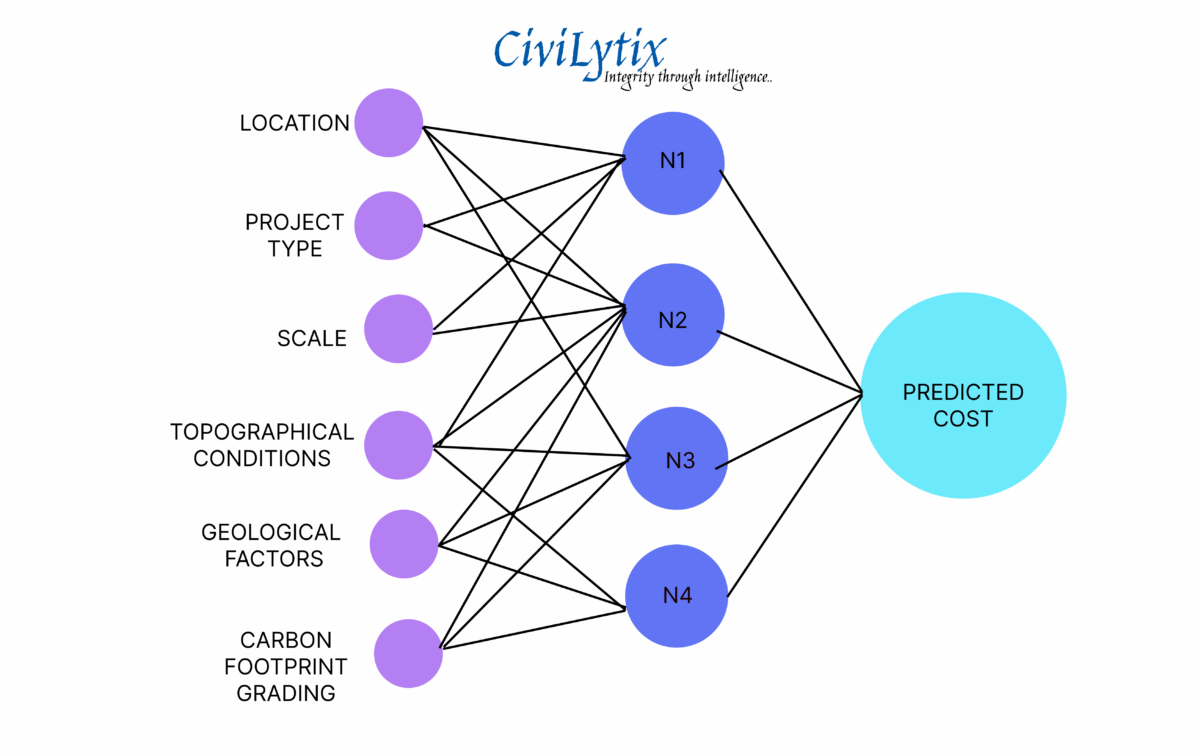
Machine Learning (ML) plays a pivotal role in the CiviLytix platform, driving innovation and ensuring the reliability of infrastructure projects. By continuously analyzing large datasets from past projects, ML models can detect anomalies in real-time, flagging unusual bidding patterns or cost discrepancies that may indicate corruption or inefficiency. This proactive approach not only prevents potential issues but also builds a more robust and transparent bidding environment.
Additionally, the use of ML in predicting project costs based on historical data and varying factors such as material prices, labor costs, and regional differences ensures more accurate budgeting and reduces the likelihood of overruns. This dynamic capability allows CiviLytix to adapt to changing circumstances and continuously improve its predictions, making it an indispensable tool for project managers and stakeholders.
Sustainable Business Model
Key Partners
|
Key Activities
|
Key Resources
|
Value Propositions
|
Customer Relationships
|
Customer Segments
|
Channels
|
Cost Structure
Negative Externalities:
Job Displacement: Automation of processes like monitoring and pricing may reduce demand for certain manual roles. Data Privacy Concerns: Increased transparency and data sharing might raise issues regarding sensitive information. Resistance to Change: Government bodies might be hesitant to shift from traditional methods to AI-driven systems. |
Revenue Streams
Positive Externalities:
Increased Public Trust: Greater transparency and accountability lead to stronger community confidence in government projects. Corruption Reduction: Improved monitoring and anomaly detection decrease opportunities for fraudulent activities. Better Service Delivery: Efficient management and proactive maintenance result in enhanced public services and infrastructure quality. |
CiviLytix operates on a sustainable business model designed to deliver long-term value while addressing critical infrastructure challenges. Our key partners include government stakeholders, industry experts, public representatives, and technical advisors, all of whom contribute to the platform’s effectiveness. We generate revenue through licensing fees, data analytics services, and grants or public funding. By integrating multiple solutions into one platform, CiviLytix reduces redundancy, enhances efficiency, and creates a seamless experience for stakeholders. Our data-driven approach, powered by ML, ensures accurate predictions and decision-making, preventing cost overruns and corruption. Furthermore, the scalability of CiviLytix allows for global expansion, starting from South Africa and extending to India and other developing countries.
Why It Matters: The Impact on SDGs
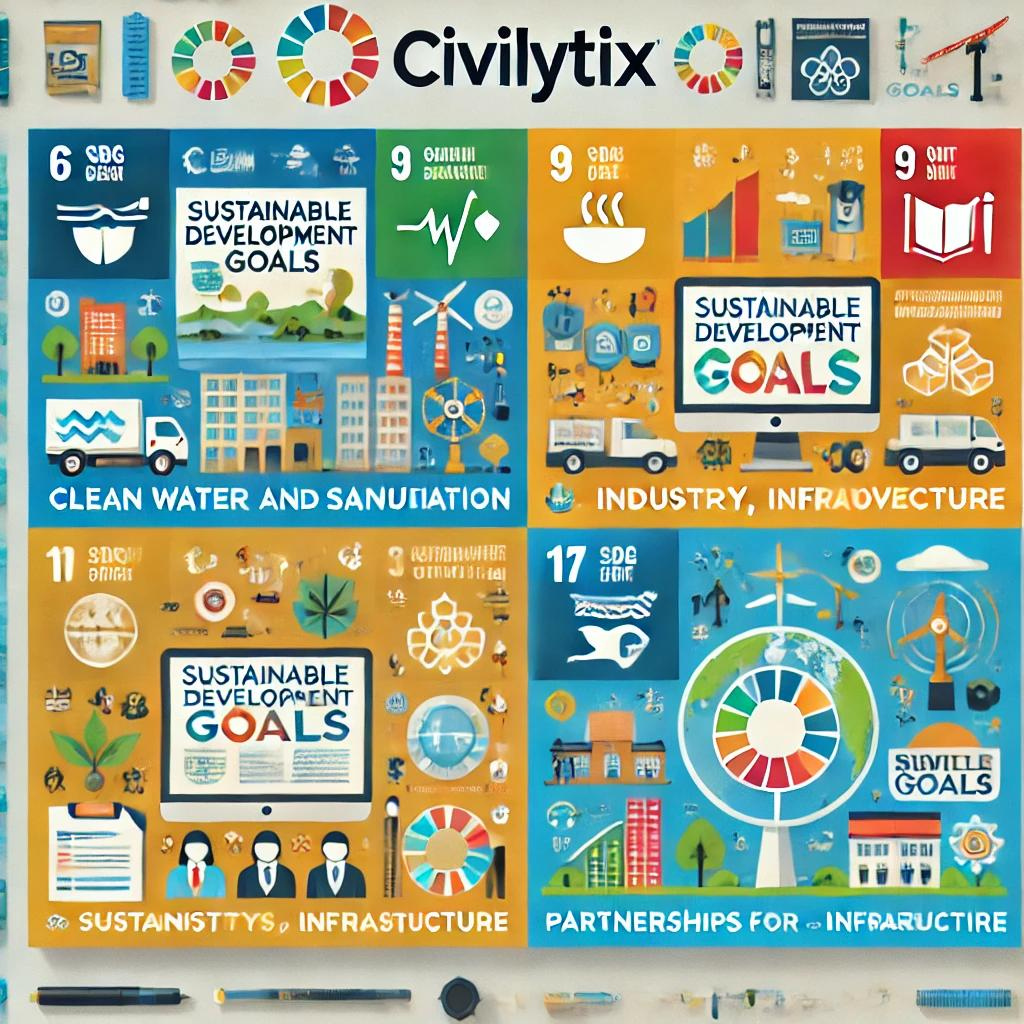
CiviLytix contributes to several Sustainable Development Goals (SDGs):
- SDG 6 (Clean Water and Sanitation): Enhancing the planning, execution, and maintenance of water and sanitation projects.
- SDG 9 (Industry, Innovation, and Infrastructure): Promoting innovation and sustainability in infrastructure projects.
- SDG 11 (Sustainable Cities and Communities): Fostering sustainable urban development through transparency and public engagement.
- SDG 17 (Partnerships for the Goals): Building strong partnerships with government bodies, local communities, and technical experts.
Inclusivity in CiviLytix
CiviLytix promotes inclusivity by integrating an AI-powered chatbot that provides an easy-to-use interface for accessing infrastructure data. This chatbot allows users to ask questions in natural language, making it simple for anyone to find the information they need, regardless of technical expertise. It also explains complex terms and concepts, helping users understand and engage with the data.
By breaking down technical barriers, CiviLytix ensures that all stakeholders, including the general public, can access, understand, and participate in discussions about public projects. This approach fosters transparency, encourages public feedback, and enhances community involvement in infrastructure management.
Real-World Implementation: A Case Study

Consider a municipality planning to install pipelines in a region with varied soil conditions. CiviLytix enables the project team to analyze costs based on the material type—whether concrete, steel, or UPVC—while factoring in the scale of the project and soil conditions. For instance, while concrete and steel might be more expensive in hard soil, UPVC could be a cost-effective option for smaller projects. Additionally, CiviLytix’s carbon footprint analysis helps the team choose materials that promote carbon neutrality, aligning the project with sustainability goals and achieving long-term cost savings.
Looking Ahead: Scaling and Expanding
CiviLytix started its journey in South Africa, but the future holds even greater promise. We are working towards scaling this solution to India and other developing countries where infrastructure challenges are similar. Beyond government projects, CiviLytix aims to become a third-party service platform for both government and private construction firms, helping to regulate infrastructure pricing, manage financial assets effectively, and monitor project delays. Our goal is to extend our licensing model, providing tailored solutions that meet the specific needs of different regions while maintaining global standards.
Future Perspectives
Looking to the future, CiviLytix aims to continue evolving as the gold standard for integrity in infrastructure management. We envision a world where every public project is managed with transparency, efficiency, and accountability, ensuring that infrastructure serves communities effectively and equitably. As we expand globally, our commitment to sustainability, innovation, and collaboration will drive us to refine our platform, introduce new features, and adapt to the ever-changing needs of the infrastructure sector.
Acknowledgments: Building on Collaboration
The success of CiviLytix is a testament to the collaborative efforts of various stakeholders. We extend our gratitude to Denmark Technical University, the Next Generation Digital Action team, SALGA, and individuals like Björgvin Hjartarson and Mr. Lubabalo Luyuba for their invaluable guidance and support.
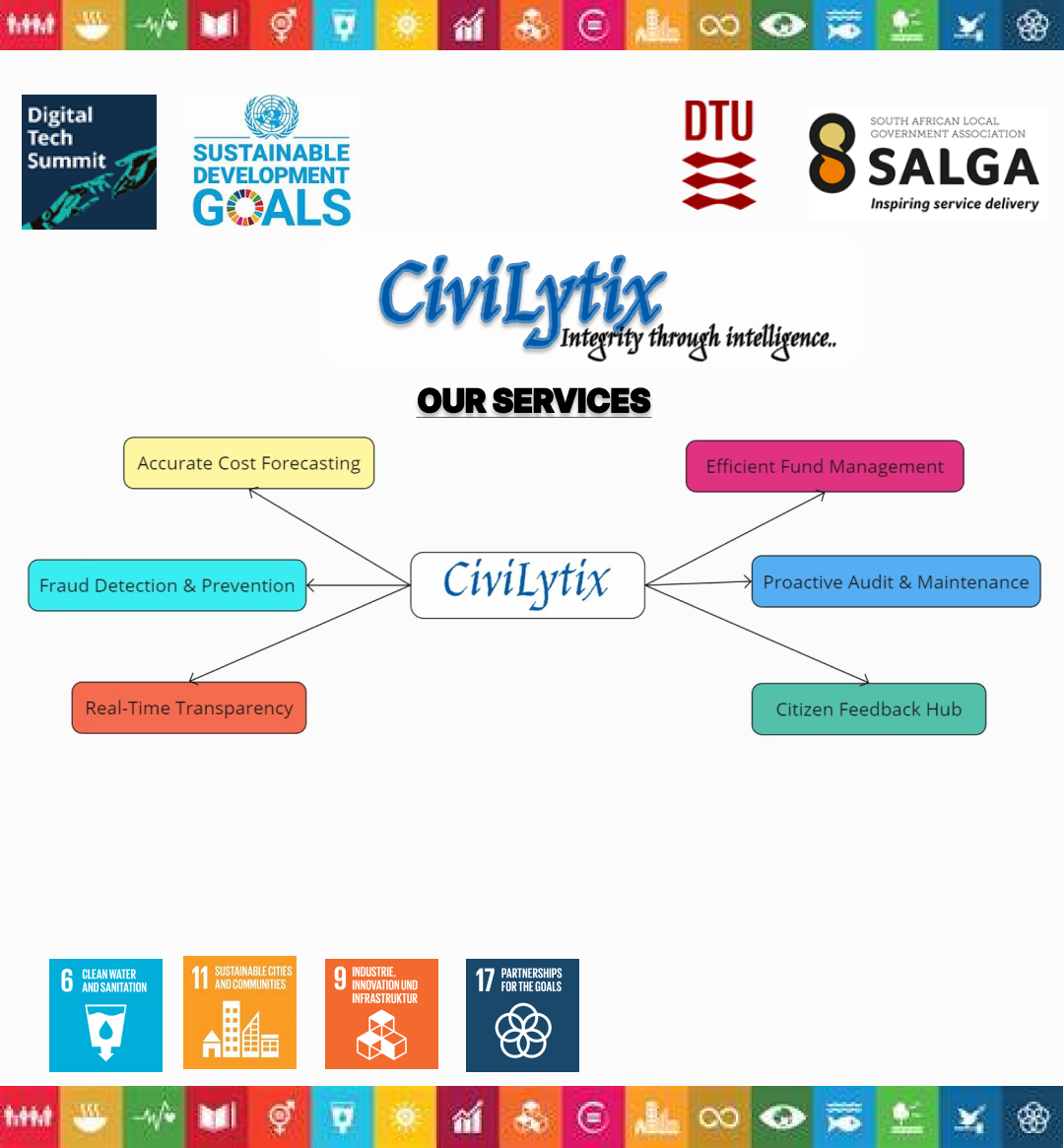
Conclusion: A New Era of Integrity in Infrastructure
CiviLytix is more than just a tool; it’s a movement towards integrity, transparency, and efficiency in infrastructure management. By combining advanced technology, especially Machine Learning, with a people-first approach, we are building a future where public projects are executed on time, within budget, and with full transparency. With CiviLytix, the future of infrastructure is transparent, efficient, and built on trust.
Integrity Through Intelligence—that’s the promise of CiviLytix. Join us on this journey to redefine how public projects are managed and delivered. Together, we can make a lasting impact on our communities and the world.
TEAM
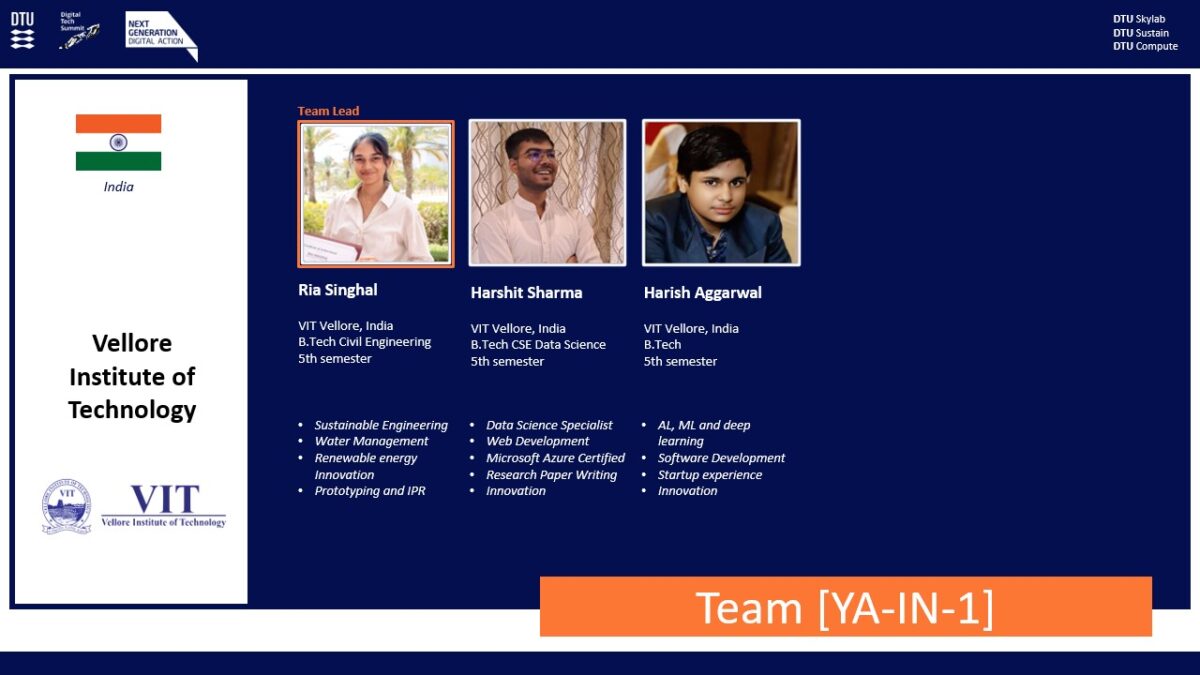
Ria Singhal Harshit Sharma
